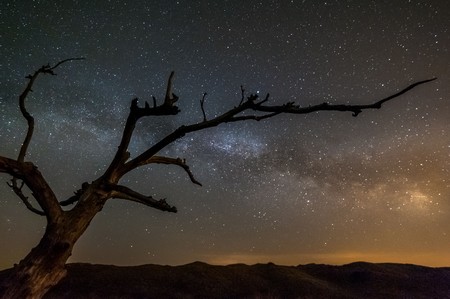Celebratory opening: ‘Donkerte van het Waddengebied’ programme
On 21 June, the longest day of the year, the online kick-off of the ‘De Donkerte van het Waddengebied’ (the darkness of the Wadden area) programme took place. The programme aims to allow residents, recreational users and tourists to experience the darkness of the Wadden area and to attract new tourists to the Wadden coast. The programme is an initiative of the nature and environment federations (Natuur en Milieufederaties) of the provinces of Friesland, Groningen and Noord-Holland, the University of Groningen (UG), the Natuurmonumenten association for nature enthusiasts and national nature reserve lobbying and management organization Staatsbosbeheer.
During the online event, these parties presented various projects that aim at stimulating the experience and preservation of darkness in the Wadden area to around 50 attendees. Via a virtual planetarium show, they were able to see the light pollution from space with their own eyes.
Experiencing nocturnal life
The programme includes projects to strengthen nocturnal nature, such as the ‘Wad een Nachtleven’ project in De Waadhoeke. This project focuses on improving the living conditions of nocturnal flora and fauna, preserving darkness and stimulating the recovery of biodiversity in the Wadden area. Awareness of the importance of darkness amongst residents and tourists will also be highlighted in the programme. In addition, other projects will focus on experiencing nocturnal life, for example via the ‘Op pad door nacht en dag’ (On the move night and day) exhibition at the Wieringer Eiland museum, stargazing evenings at the new observatory that is currently being built and night-time walks in the Dark Sky Park in Lauwersmeer, as well as the fun activities involved in the ‘Nacht van het Wad’ (Night of the Wadden mudflats) event.

Night almanac
Some projects will emphasize stimulating and supporting the awareness, knowledge and experience of darkness and nocturnal flora and fauna in the Wadden area. For instance, the UG will work on a darkness measuring network, with light recorders set up in fixed spots in the Wadden area to continuously monitor the light levels, as well as a mobile network with measuring equipment that can be rented out. A night almanac will also be created, which will include multiple nocturnal locations and activities. In addition, nature guides will be trained to lead night-time excursions and products will be developed with and for local businesses in the tourist industry.
Participants
As well as the previously mentioned parties, a large number of local organizations and businesses will also be involved and encouraged to participate. The overarching goal is to promote the darkness of the Wadden area, to supplement initiatives that arose from the Dark Sky Werelderfgoed Waddenzee (Dark Sky World Heritage Wadden Sea) declaration of 2016.
See also: 1.5 million euros for “The Darkness of the Wadden Region"
More news
-
29 January 2026
Microplastic research - media hype or real danger?
-
27 January 2026
ERC Proof of Concept grant for Maria Loi
